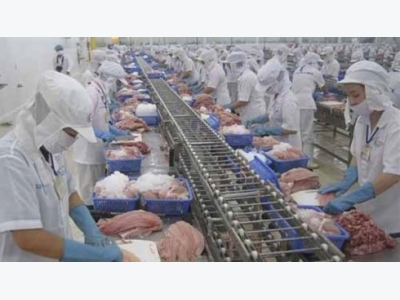Catfish exporters object to US DOC preliminary anti-dumping order

On October 14, 2016, the US Department of Commerce initiated its 13th administrative review of an antidumping duty order on frozen fish fillets from Vietnam for the period August 1, 2015, through July 31, 2016.
Subsequently, on April 11, 2017, the Department fully extended the deadline for issuing its preliminary order for the review by a full 120 days, resulting in a revised deadline of August 31, 2017.
Scope of the Order
The scope of the preliminary order issued, which became effective September 12, 2017, covered frozen fish fillets, including regular, shank, and strip fillets and portions thereof, whether breaded or marinated, of the species Pangasius Bocourti, Pangasius Hypophthalmus (also known as Pangasius Pangasius) and Pangasius Micronemus.
These products are classifiable under tariff article code 0304.62.0020 (Frozen Fish Fillets of the species Pangasius, including basa and tra), and may enter under tariff article codes 0305.59.0000, 1604.19.2100, 1604.19.3100, 1604.19.4100, 1604.19.5100, 1604.19.6100 and 1604.19.8100 of the Harmonized Tariff Schedule of the US.
Preliminary Results of Review
The Department preliminarily determined a US$2.39 weighted-average dumping margin per kilogram for the period August 1, 2015, through July 31, 2016 for 10 Vietnamese companies including the GODACO Seafood Joint Stock Company.
Although the Department found that GODACO was preliminarily entitled to be eligible for a separate rate, its margin was based on adverse facts available due to its failure to cooperate and provide information requested.
Disclosure, Public Comment & Opportunity to Request a Hearing
Normally, the Department discloses to interested parties the calculations performed relating to the preliminary results within five days of its public announcement. However, because the Department preliminarily determined that GODACOs rate was based entirely on adverse facts available, there are no calculations to disclose.
GODACO and/or other interested parties may submit case briefs within 30 days as of September 12, 2017 to rebut any of the preliminary results of the review and the imposition of the US$2.39 weighted-average dumping margin per kilogram.
Pursuant to 19 CFR 351.310(c), GODACO and/or other interested parties who wish to request a hearing on any matter in the preliminary determination that they dispute must submit a written request to the Assistant Secretary for Enforcement and Compliance within 30 days of September 12, 2017.
If the Department does not receive any objections to the preliminary determination it will proceed to issue the final results of this administrative review within 120 days of September 12, 2017.
According to a news report published by Vnexpress.vn, the Vietnam Association of Seafood Exporters and Producers and GODACO disagree with the preliminary findings and will be filing case briefs to rebut the preliminary decision.
It is important to be clear that the determinations issued by the Department – is preliminary – and provides both VASEP and GODACO 30 days to submit briefs stating in detail their rebuttal as well as provide the information that they previously failed to turn over as requested.
Or, if as VASEP and GODACO claim, they already submitted the information, then they now have an opportunity to resubmit it within 30 days of September 12, 2017.
If VASEP and GODACO comply with the US law, which fully adheres to the laws and regulations of the World Trade Organization, then their rebuttals will be heard prior to the final issuance of any decision on the matter.
After all, the Department acknowledged in its preliminary decision that GODACO was entitled to a separate rate and that it only preliminarily imposed the countrywide rate of US$2.39 weighted-average dumping margin per kilogram— because the company wilfully refused to provide information requested of it.
Related news
 VASEP highlights risk of IUU fishing
VASEP highlights risk of IUU fishing This is an important step to stop Vietnamese seafood from being warned or prohibited from importing to key markets such as the European Union and the US
 Aquaculture’s global potential revealed
Aquaculture’s global potential revealed Nearly every coastal country has the potential to meet its own domestic seafood needs through aquaculture. according to a recent report from marine scientists
 Does aquaculture impact wild fish quality?
Does aquaculture impact wild fish quality? The belief that fish farms have an adverse impact on the quality of wild fish caught in their vicinity is largely misplaced, according to a recent study.